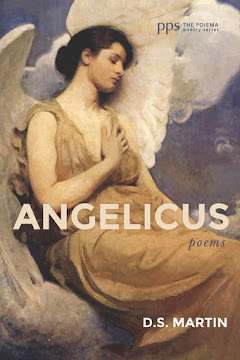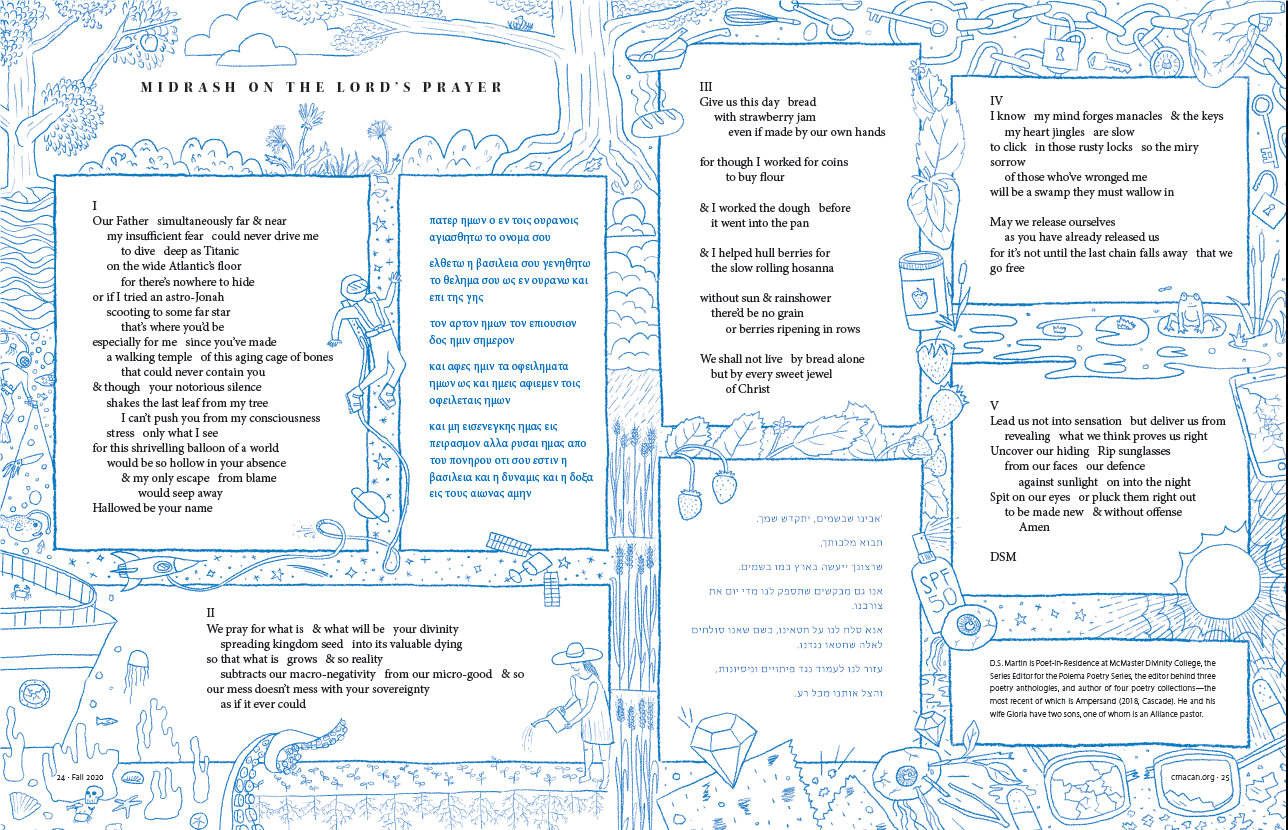Barbara Crooker is a Pennsylvania poet whose poems have been well-received by many who know the artform well. They’ve been featured many times on The Writer’s Almanac as read by Garrison Keillor — and for The Slowdown podcast, read by then U.S. Poet Laureate Tracy K. Smith.
I was pleased to see Barbara, along with other friends from our tight-knit poetry community, at the Festival of Faith and Writing in April. She gave me a copy of her tenth book, Slow Wreckage which had just appeared from Grayson Books. Her other recent books include: Some Glad Morning (University of Pittsburgh Press) and The Book of Kells (Poiema/Cascade) which was honoured as the Best Poetry Book of 2018 from Poetry by the Sea.
She has won numerous other awards including the Paterson Award for Literary Excellence, the WB Yeats Society of New York Award, the Thomas Merton Poetry of the Sacred Award, and she is a sixty-one time nominee for the Pushcart Prize.
The following poem first appeared in my web-journal Poems For Ephesians — and is from Slow Wreckage.
Sonnet From The Ephesians
----- — Ephesians 1:16
I do not cease to give thanks, especially in November
even as we lose an hour of light, drawing
the curtains at 4:30 to keep out the cold. To remember
you are dust seems appropriate now. Crows are cawing
black elegies in the bare trees. Just past the Day of the Dead,
and I’m thankful for every friend who has blessed
my life, gold coins in a wooden chest. Who said
no man is an island? We’re all peninsulas, I guess,
joined to the mainland, part of the shore. We’re the sticks
in the bundle that can’t be broken. Even if
it doesn’t seem that way, the bickering of politics,
the blather on the nightly news. Maybe we speak in hieroglyphs,
unclear, always missing the mark? So let me be plain.
I’m grateful for the days of sun. I’m grateful for the rain.
Posted with permission of the poet.
*This is the fourth Kingdom Poets post about Barbara Crooker: first post, second post, third post.
Entry written by D.S. Martin. He is the author of five poetry collections including Angelicus (2021, Cascade) ― a book of poems written from the point-of-view of angels. His books are available through Wipf & Stock.
Monday, May 27, 2024
Monday, May 20, 2024
John Bunyan*
John Bunyan (1628—1688) is an English writer and Puritan preacher who is the renowned author of The Pilgrim’s Progress.
At age sixteen he joined the Parliamentary Army during the early stages of the English Civil War, serving for three years. Years later he became involved with a nonconformist sect who met in Bedford, and he became a preacher. After the restoration of the monarchy he was arrested and spent twelve years in prison for refusing to abstain from preaching. During this time he wrote his spiritual autobiography, Grace Abounding to the Chief of Sinners, or a Brief Relation of the Exceeding Mercy of God in Christ to his Poor Servant John Bunyan, which was published in 1666. This was also when he began work on The Pilgrim’s Progress.
In the second part of The Pilgrim’s Progress, Christian is led by Mr. Greatheart through the Valley of Humilation, where he hears the following song being sung by a shepherd boy.
The Shepherd Boy
He that is down needs fear no fall,
He that is low, no pride;
He that is humble ever shall
Have God to be his guide.
I am content with what I have,
Little be it or much:
And, Lord, contentment still I crave,
Because Thou savest such.
Fullness to such a burden is
That go on pilgrimage:
Here little, and hereafter bliss,
Is best from age to age.
*This is the second Kingdom Poets post about John Bunyan: first post.
The most recent post at Poems For Ephesians is also a poem by John Bunyan.
Entry written by D.S. Martin. He is the author of five poetry collections including Angelicus (2021, Cascade) ― a book of poems written from the point-of-view of angels. His books are available through Wipf & Stock.
At age sixteen he joined the Parliamentary Army during the early stages of the English Civil War, serving for three years. Years later he became involved with a nonconformist sect who met in Bedford, and he became a preacher. After the restoration of the monarchy he was arrested and spent twelve years in prison for refusing to abstain from preaching. During this time he wrote his spiritual autobiography, Grace Abounding to the Chief of Sinners, or a Brief Relation of the Exceeding Mercy of God in Christ to his Poor Servant John Bunyan, which was published in 1666. This was also when he began work on The Pilgrim’s Progress.
In the second part of The Pilgrim’s Progress, Christian is led by Mr. Greatheart through the Valley of Humilation, where he hears the following song being sung by a shepherd boy.
The Shepherd Boy
He that is down needs fear no fall,
He that is low, no pride;
He that is humble ever shall
Have God to be his guide.
I am content with what I have,
Little be it or much:
And, Lord, contentment still I crave,
Because Thou savest such.
Fullness to such a burden is
That go on pilgrimage:
Here little, and hereafter bliss,
Is best from age to age.
*This is the second Kingdom Poets post about John Bunyan: first post.
The most recent post at Poems For Ephesians is also a poem by John Bunyan.
Entry written by D.S. Martin. He is the author of five poetry collections including Angelicus (2021, Cascade) ― a book of poems written from the point-of-view of angels. His books are available through Wipf & Stock.
Monday, May 13, 2024
Scott Cairns*
Scott Cairns is Curators’ Distinguished Professor Emeritus at University of Missouri, and is presently facilitating the transition of the Seattle Pacific University low-residency MFA program in Creative Writing to Whitworth University.
He is the author of ten poetry collections, the most recent of which is Lacunae (2023, Iron Pen/Paraclete Press). The word “lacuna” means a blank space, missing part, or empty hollow — and Cairns uses the word in various contexts, such as in the introductory poem, “Recuperating Lacunae”:
-----No, not so much---------------an emptiness, never yet
-----an emptiness.------------------Think, rather, a discrete
-----cove proving still---------------to offer—and ever
-----to offer—what one-------------cannot, can never,
-----comprehend…
He has long been a poet striving to describe the indescribable, and slow to accept common theological interpretations as the whole truth.
Robert Cording recently wrote, “For Cairns, language is a form of faith, faith that reaches out towards what is inexhaustible and uncontainable, and faith that trusts words can be a means of coming nearer to what necessarily remains out of reach… Lacunae is the work of a faithful and faith-filled man unafraid of letting his ego be seared, of living in time that continues ‘ticking in perplexity.’”
The following poem is from Cairn’s new poetry collection, Lacunae.
Implicative Lacunae
-----…It was like
-----A new knowledge of reality.
-------------------------— Stevens
Entering the clearing, he knew
That he had heard it, the single
note expanding beyond the reach
of any single note, as if,
finally, his dim ideas
about things showed themselves to be
stick figures failing to evince
the fullness of the body. She
said to him so, at long last you
have heard it, yes? He stood just there
at the clearing’s edge, daring not
to speak. He closed his eyes that he
might better listen, and the note
became a space like the clearing
into which all that could be sung
found dwelling, and he became
like a man without a doctrine,
became a man intent on praise,
a man whose freedom would ever
expand, would ever reach toward.
Posted with permission of the poet.
*This is the fourth Kingdom Poets post about Scott Cairns: first post, second post, third post.
Entry written by D.S. Martin. He is the author of five poetry collections including Angelicus (2021, Cascade) ― a book of poems written from the point-of-view of angels. His books are available through Wipf & Stock.
He is the author of ten poetry collections, the most recent of which is Lacunae (2023, Iron Pen/Paraclete Press). The word “lacuna” means a blank space, missing part, or empty hollow — and Cairns uses the word in various contexts, such as in the introductory poem, “Recuperating Lacunae”:
-----No, not so much---------------an emptiness, never yet
-----an emptiness.------------------Think, rather, a discrete
-----cove proving still---------------to offer—and ever
-----to offer—what one-------------cannot, can never,
-----comprehend…
He has long been a poet striving to describe the indescribable, and slow to accept common theological interpretations as the whole truth.
Robert Cording recently wrote, “For Cairns, language is a form of faith, faith that reaches out towards what is inexhaustible and uncontainable, and faith that trusts words can be a means of coming nearer to what necessarily remains out of reach… Lacunae is the work of a faithful and faith-filled man unafraid of letting his ego be seared, of living in time that continues ‘ticking in perplexity.’”
The following poem is from Cairn’s new poetry collection, Lacunae.
Implicative Lacunae
-----…It was like
-----A new knowledge of reality.
-------------------------— Stevens
Entering the clearing, he knew
That he had heard it, the single
note expanding beyond the reach
of any single note, as if,
finally, his dim ideas
about things showed themselves to be
stick figures failing to evince
the fullness of the body. She
said to him so, at long last you
have heard it, yes? He stood just there
at the clearing’s edge, daring not
to speak. He closed his eyes that he
might better listen, and the note
became a space like the clearing
into which all that could be sung
found dwelling, and he became
like a man without a doctrine,
became a man intent on praise,
a man whose freedom would ever
expand, would ever reach toward.
Posted with permission of the poet.
*This is the fourth Kingdom Poets post about Scott Cairns: first post, second post, third post.
Entry written by D.S. Martin. He is the author of five poetry collections including Angelicus (2021, Cascade) ― a book of poems written from the point-of-view of angels. His books are available through Wipf & Stock.
Monday, May 6, 2024
Herman Melville
Herman Melville (1819—1891) is a writer best known for writing one of the greatest American novels — his ambitious 1851 masterpiece Moby-Dick. He wrote many novels during his early career, often based on his own experience at sea and other travels. It was not until well into the twentieth century that the reputation of Moby-Dick began to grow.
One fascinating resource for Melville scholars online, is Melville’s Marginalia. It is an archive of books owned or borrowed by Melville which influenced his work. The most referenced book there is his well-annotated copy of The New Testament and The Book of Psalms — a volume he clearly often had at his side while writing. The following paragraph comes from the introduction, to this resource by Brian Yothers (University of Texas at El Paso).
-----In reading Romans 14.22, Melville paused to underline this
-----sentence: "Hast thou faith? Have it to thyself before God."
-----And in the top margin, he inscribed an elliptical response:
-----"The only kind of Faith—one's own" (274.2:4-5). This and
-----other marginalia in the New Testament and Psalms constitute
-----a compelling chapter in Melville's spiritual autobiography
-----and contribute greatly to our understanding of his own kind
-----of faith and how it related to his personal life.
In 1863 Herman Melville moved to New York City, where he had been born, and from then on he focussed on writing poetry. In 1866 his collection Battle-Pieces and Aspects of the War, which reflected on the American Civil War appeared. This was followed by Clarel: A Poem and Pilgrimage in the Holy Land (1876). His novella Billy Budd was published posthumously in 1924.
The Martyr
Good Friday was the day
-----Of the prodigy and crime,
When they killed him in his pity,
-----When they killed him in his prime
Of clemency and calm—
----------When with yearning he was filled
----------To redeem the evil-willed,
And, though conqueror, be kind;
-----But they killed him in his kindness,
-----In their madness and their blindness,
And they killed him from behind.
--------------------There is sobbing of the strong,
-------------------------And a pall upon the land;
--------------------But the People in their weeping
-----------------------------------Bare the iron hand:
--------------------Beware the People weeping
-------------------------When they bare the iron hand.
He lieth in his blood—
-----The father in his face;
They have killed him, the Forgiver—
-----The Avenger takes his place,
The Avenger wisely stern,
----------Who in righteousness shall do
----------What heavens call him to,
And the parricides remand;
-----For they killed him in his kindness,
-----In their madness and their blindness.
And his blood is on their hand.
--------------------There is sobbing of the strong,
-------------------------And a pall upon the land;
--------------------But the People in their weeping
-----------------------------------Bare the iron hand:
--------------------Beware the People weeping
-------------------------When they bare the iron hand.
Entry written by D.S. Martin. He is the author of five poetry collections including Angelicus (2021, Cascade) ― a book of poems written from the point-of-view of angels. His books are available through Wipf & Stock.
One fascinating resource for Melville scholars online, is Melville’s Marginalia. It is an archive of books owned or borrowed by Melville which influenced his work. The most referenced book there is his well-annotated copy of The New Testament and The Book of Psalms — a volume he clearly often had at his side while writing. The following paragraph comes from the introduction, to this resource by Brian Yothers (University of Texas at El Paso).
-----In reading Romans 14.22, Melville paused to underline this
-----sentence: "Hast thou faith? Have it to thyself before God."
-----And in the top margin, he inscribed an elliptical response:
-----"The only kind of Faith—one's own" (274.2:4-5). This and
-----other marginalia in the New Testament and Psalms constitute
-----a compelling chapter in Melville's spiritual autobiography
-----and contribute greatly to our understanding of his own kind
-----of faith and how it related to his personal life.
In 1863 Herman Melville moved to New York City, where he had been born, and from then on he focussed on writing poetry. In 1866 his collection Battle-Pieces and Aspects of the War, which reflected on the American Civil War appeared. This was followed by Clarel: A Poem and Pilgrimage in the Holy Land (1876). His novella Billy Budd was published posthumously in 1924.
The Martyr
Good Friday was the day
-----Of the prodigy and crime,
When they killed him in his pity,
-----When they killed him in his prime
Of clemency and calm—
----------When with yearning he was filled
----------To redeem the evil-willed,
And, though conqueror, be kind;
-----But they killed him in his kindness,
-----In their madness and their blindness,
And they killed him from behind.
--------------------There is sobbing of the strong,
-------------------------And a pall upon the land;
--------------------But the People in their weeping
-----------------------------------Bare the iron hand:
--------------------Beware the People weeping
-------------------------When they bare the iron hand.
He lieth in his blood—
-----The father in his face;
They have killed him, the Forgiver—
-----The Avenger takes his place,
The Avenger wisely stern,
----------Who in righteousness shall do
----------What heavens call him to,
And the parricides remand;
-----For they killed him in his kindness,
-----In their madness and their blindness.
And his blood is on their hand.
--------------------There is sobbing of the strong,
-------------------------And a pall upon the land;
--------------------But the People in their weeping
-----------------------------------Bare the iron hand:
--------------------Beware the People weeping
-------------------------When they bare the iron hand.
Entry written by D.S. Martin. He is the author of five poetry collections including Angelicus (2021, Cascade) ― a book of poems written from the point-of-view of angels. His books are available through Wipf & Stock.
Subscribe to:
Posts (Atom)






















